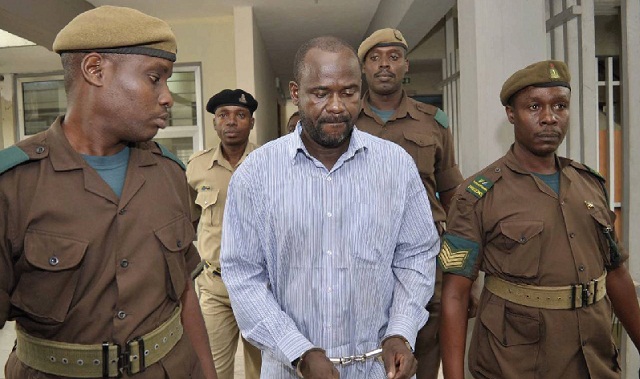
According to Jean-Pierre Lacroix, the UN peacekeeping chief, the UN and Congolese troops faced two separate attacks by ADF fighters on Nov.16.
Lacroix explained that joint force repelled the first attack successfully but then the rebels re-organised and in the second attack killed peacekeepers.
Estimates indicate that after suffering a number of setbacks that brought down its numbers to slightly over 100, the ADF has in the last few years grown them again to about 500 fighters.
This resurgence of ADF is a surprise to many who hoped that the group would be weakened and thrown into disarray following the April 2015, arrest of their commander, JamilMukulu by Tanzanian authorities.
The Tanzanian authorities later extradited Mukulu to Uganda where he and 37 others are facing charges of terrorism, crimes against humanity, aiding and abetting terrorism, murder, attempted murder, among others.
ADF, which was founded in Uganda in the early 90’shas been accused of the murder of 80 students ofKichwamba Technical Institutein 1998 and the killing of 38 civilians in Bundibugyo district of western Uganda.
The Ugandan army only forced the group to move all of its bases into the Congo in 2000 after their combined operations had led to the death of up to a 1,000 people since 1996, estimates indicate.
Over the years, the group has been blamed for a series of murders. On June 6, for instance, while appearing before parliament, President YoweriMuseveni blamed the ADF for the murder of former Assistant Inspector General of Police Andrew Felix Kawesi who was murdered on March 17 last year, that of seven Muslim clerics, assassinated in various parts of the country since 2012, the murder of Major MuhammedKiggundu, a former ADF commander turned government collaborator.
He also blamed ADF for the murder of Joan Kagezi, who at the time of her murder in 2015, was the lead prosecutor in the trial of suspects who were later convicted for bombing Kampala in 2010.
The president also blamed the ADF for the death of Susan Magara, who was kidnapped for weeks and later killed.
The President’s revelations, while doubted by many, were not surprising because over the years, his security chiefs including former police chief, Gen. Kale Kayihura had previously blamed all these murders on the same rebel outfit.
President Museveni also said the DR Congo government and the United Nations were responsible for the survival of the ADF.
A recent report on the ADF by the Congo Research Group notes that currently, there are two main groups of the ADF, one in southern Beni territory, based in the flood plain of the Semuliki river around Mwalika village; and the other in the so-called “Triangle of Death”, to the east of the Beni-Eringeti road.
According to the report, there has been significant fragmentation within the group, with some factions no longer answering to ADF command.
Several ex-combatants, the report notes, the Mwalika camp is the transit point for new recruits and is an important relay point for supplies coming from Uganda and local markets there.
Since the arrest of Mukulu, the report notes, Musa SekaBaluku leads the group. “Hood Lukwago remains army commander, and almost all of the senior officers named by a defector in 2018 with close knowledge of the senior command, and corroborated by Ugandan intelligence officers, were listed four year ago as senior ADF leaders, although they have been shuffled between positions,” the report adds.
Over the years, the report notes, the ADF has always maintained ties within the Ugandan Muslim diaspora. It adds that JamilMukulu used to travel to the United Kingdom on a British passport, lived in Nairobi, and maintained financial interests in Tanzania.
According to two defectors, the report adds, members of the Muslim community in the United Kingdom sent money and facilitated recruitment for the ADF.
“UN investigators have discovered, for example, evidence of Western Union transfers during 2013 and 2014 from people in the United Kingdom to ADF agents in eastern Congo totaling at least $14,970.84,” the report reads in part.
Links with Islamist groups
The report also notes that while the Ugandan government has accused the ADF of being behind the assassinations of Muslim clerics, a former ADF commander who had been integrated into the Ugandan army, as well as a senior prosecutor and police commander, there is no evidence confirming these.
The report also notes that although government implicated the group in the July 2010 bombing of several restaurants in Kampala that killed 65 people, there was no evidence to confirm that claim, and US investigators at the time expressed skepticism.
However, the report shows that the arrest of Waleed Ahmed Zein, a Kenyan national and ISIS financial facilitator, and him being placed under US sanctions is the first material evidence of links between the ADF and global jihadist networks.
Zein was arrested in July 2018 on terrorism financing charges and was sanctioned by the US government in September 2018.
Kenyan police alleged that he was responsible for moving over $150,000 through a network linked to ISIS, which spanned numerous countries, including the Congo.
Apparently, Ugandan officials claim that Zein was in touch with the ADF, and one ADF defector told CRG that a man by that name had sent her money in Kampala.
Sources close to the US government also confirmed that Zein had sent money to the ADF.
 The Independent Uganda: You get the Truth we Pay the Price
The Independent Uganda: You get the Truth we Pay the Price


